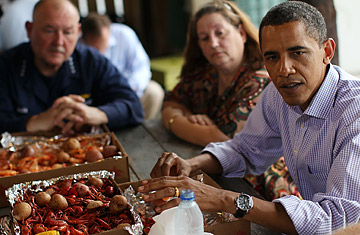
Barack Obama and Adm. Thad Allen meet with local leaders during a visit June 4, 2010 in Grand Isle, Louisiana. President Obama, during a speech about job gains in Hyattsville, Md., on June 4, 2010
On Saturday afternoon, Chris Carmadelle stood at the counter of his seafood restaurant here, and waited for a tide of customers that never came. Oil from the worst environmental disaster in U.S. history has infused the waters around this island village. Just the day before, President Obama made his second visit to the island since the crisis began and ate crawfish at Carmadelle's Seafood. Crawfish brought in from mainland Louisiana is all Carmadelle really has to sell. There's no fish, no shrimp. "That monster," Carmadelle said, referring to the oil, "is killing us."
Carmadelle, 51, has fished the waters of the Gulf of Mexico and Barataria Bay "ever since I could walk." Hurricane Katrina destroyed his family's restaurant and bait shop. So he rebuilt. This was supposed to be the year of a true comeback. But now, he and Grand Isle (pop. 1,600) are at the center of the Gulf oil crisis. Many of its residents rely on commerce generated by the crews manning the oil rigs that sit within view of the beach. But the Obama Administration's six-month moratorium on new deepwater oil drilling is increasing angst. So is the question of whether the seafood industry will ever recover.
The locals also wonder what the jobs and money offered by BP, the oil giant at the heart of the catastrophe, will ultimately amount to. BP has said it has spent some $84 million on claims to individuals and businesses across the Gulf Coast, and expects to send a second round of payments soon. "We're stuck in the middle," said Gilbert Stoufflet, 67, a retired oil contractor, as he sat inside Carmadelle's on Saturday. "So it's a tricky situation."
Nearly every house on Grand Isle, it seems, has a name: Milky Way. Sugar Shack II (but no Sugar Shack I), Paw's Dream. Just over the sand dunes lies the beach, sliced by thick, orange, rubber-like boom intended to keep oil-tainted water from moving further ashore. Dressed in white jumpsuits, gloves and boots, clean-up workers — many brought in by school buses each morning from New Orleans — are shoveling globs of greased-up sand into clear plastic bags. Just a few feet away, in Barataria Bay, workers are pulling out pelicans, fish and other wildlife slathered with oil.
On Oak Lane, many of the houses are built on stilts, standing between 12 and 15 feet in the air to withstand the constant floods. Terry Vargas, a third-generation shrimper, is building a shed here. It's the only work he can find now that shrimping and fishing are effectively banned nearby. One morning two weeks ago, he came back to shore with $1,400 worth of shrimp. The next day, authorities closed the waters near Grand Isle to shrimping and fishing — anticipating the oil-polluted water that's now slapping onto shore, "like peanut butter," he says. Vargas says he signed up to bring his boat to help BP's clean-up effort. But that means working out of Venice, La., at the base of the Mississippi River, about four hours away. It would mean leaving his wife, who is at home suffering from emphysema. Working out of Venice, he says, "makes no sense, because we've got oil right here" that needs to be cleaned up.
Still, many fishermen have taken the BP clean-up job. Vargas has received the first check of $5,000 BP is paying to captains of boats that aren't working. In a good year, he says, "I can make that in two nights." That's unlikely to cover his expenses. Or make up for the $20,000 he could have made in a month. The shrimping season typically extends from May through Labor Day. People here tend to start the season broke, having bought groceries, bait and other boat supplies on credit. That's not to mention the flood, wind and water insurance, which often tops $4,800 a year.
Vargas' brother, Percy, took his boat out to Venice to work for BP. His wife, Theresa, an assistant treasurer for the city of Grand isle, had crunched the numbers: If her husband sticks with the cleanup process through August, they could be paid about $250,000 — "more than we've ever made in our lives." But she is worried about the health risks, particularly involving the use of the chemicals BP is utilizing to disperse the oil. For weeks, Percy told Theresa that he was feeling fine. But last week, after hearing reports that several cleanup workers had been checked into hospitals, she drove to Venice. "I wanted to see him eye-to-eye, to know he was feeling well," she says. Thankfully, she says, he's doing OK. Nevertheless, whenever her husband has expressed doubt about the work, she tells him: Just hang in there. There are few alternatives, at this point. "They're dangling a carrot in front of our faces," she says.
Terry Vargas stood among the 12-foot-high stilts, and carefully thought about the hurricane season that's approaching. Hurricane Katrina sent sand into his living room. "If that oil comes ashore," he says, "it's all over. Just imagine: oil in my living room." People here know how to deal with hurricanes: They evacuate, then return, then rebuild. But this is a very different monster. And it may just lead to Grand Isle's undoing.
